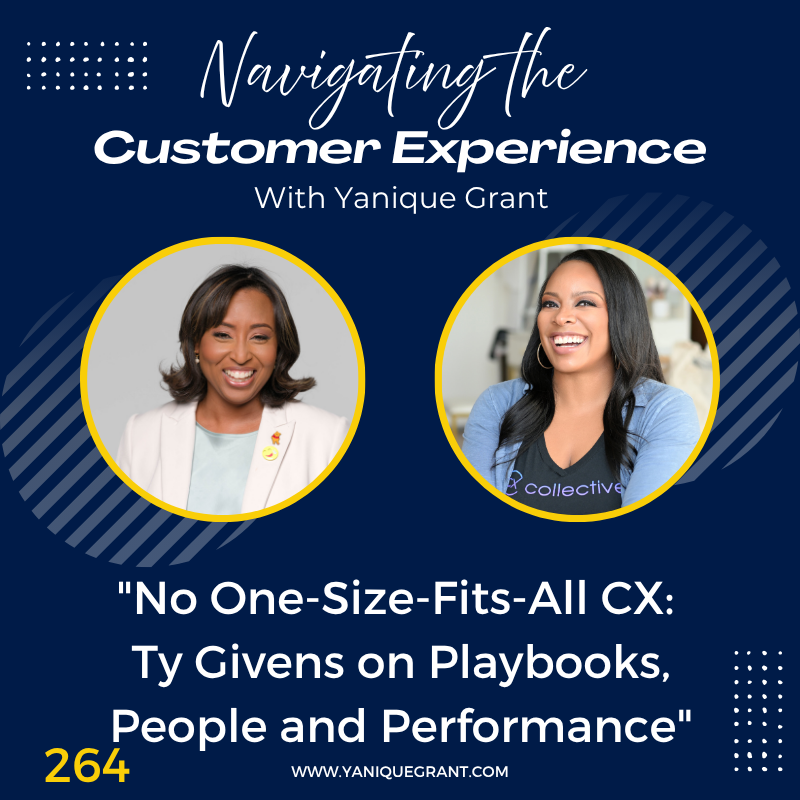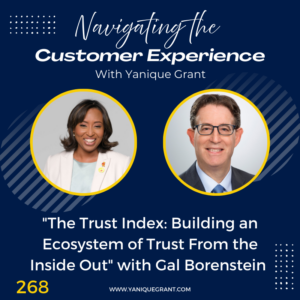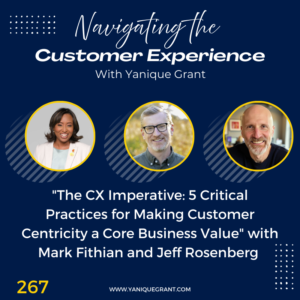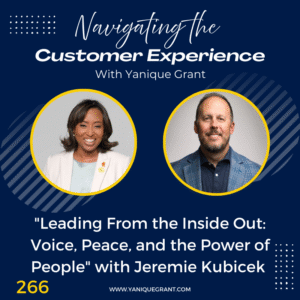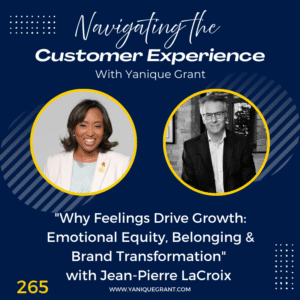Ty Givens is a Founder and CEO of CX Collective, where she partners with ambitious brands to build customer experience programs that don’t just keep up- they lead. Over her career, Ty has transformed support operations at every stage, from scrappy startups launching their first helpdesk to Fortune 500s rethinking how they serve millions of customers.
Known for blending operational rigor with a human touch, she is passionate about creating service systems that scale without losing authenticity. Ty’s work bridges the gap between vision and execution, equipping teams to deliver exceptional experiences that grow loyalty-and the bottom line.
Questions
- Could you share with our audience a little bit about how you got from where you were to where you are today?
- If you were to tell our audience your greatest reward since you’ve started CX Collective, what would that be?
- Customer experience can be one of the most challenging areas to work in because it involves managing people, who can often be unpredictable. Over the years, as you transitioned through different organizations and eventually became the CEO of your own company for the past 9 years, what key leadership lessons have you learned along the way?
- Leading support teams can take an emotional toll, especially in customer experience where emotional intelligence varies widely from person to person. How do you navigate these challenges, and what strategies have you used to help people grow and become more emotionally proficient?
- Now, could you share with our listeners, what’s the one online resource, tool, website or application that you absolutely can’t live without in your business?
- Can you also share with us maybe one or two books that you’ve read that have had a positive impact on you, it could be a book that you read a very long time ago, or even one that you’ve read recently.
- Could you also share with our audience one thing that is going on your life right now that you are really excited about, either something you’re working on to develop yourself or your people.
- Now, we always like to ask our guests, before we wrap our episodes up, if you could share with us a quote or saying that during times of adversity or challenge, you’ll tend to revert to this quote if for any reason you get derailed or you get off track, the quote kind of helps to get you back on track. Do you have one of those?
Highlights
Ty’s Journey
Me: Now, we always like to give our guests an opportunity to share a little bit about their journey. So, could you share with our audience a little bit about how you got from where you were to where you are today?
Ty shared that she started her career in customer experience at the young age of 18 years old. Her first desk, she guesses real job is the best way for her to describe it, doing customer service, she worked for Office Depot, and within 6 months, she had applied to and got promoted into a position doing workforce management.
And so, she doesn’t think at that time she really understood that she had started a career. She just went into workforce management, and she was like, “Oh, this is fun.” Highly analytical, very technical, and she liked it, and so, when they announced layoffs and it was time to look for another job, she realized that other people did this too, that’s the fun part of being 18 years old or 19 years old and not really understanding where you are in the scheme of things.
So, from there, she started to work in companies as an analyst, and then she ended up leading her own team for Intuit when she was 24, that was a fun experience, a lot of growing. But from there, she started leading teams. So, she did workforce management as an analyst, manager, then a director, then global director, and then she started to run support teams, because when you’re working as workforce manager, your job is to give the business a plan for success.
If the business doesn’t follow that plan, you’re still responsible for explaining the whys, she kind of got tired of that, to be honest with you. And so, she was like, “Well, I’ll just run the team, and then I’ll understand.” So, she did that for a while, and then she was brought in, usually to, like, mature and fix support teams that were really new or were very messy.
And in doing that, she realized the companies were expecting her to be the fix or the solution, where what she knew coming from, having worked at larger organizations, is that it’s not a one-person job. So, after working herself into a frenzy, she decided, “You know what I’m going to do, I’m going to go into companies with a team that can fix all of those things.” And they spent shorter stints in there repairing and then they move on. And so, her company was born 9 years ago. So, that’s her journey, and here she is today.
Greatest Reward Since Starting CX Collective
Me: So, if you were to tell our audience your greatest reward since you’ve started CX Collective, what would that be?
Ty shared that actually getting to see the results of the work that they do. And it could be something as small as revamping clients Help Center to make it easier to search or revamping it to make it where your AI bot can easily pull information from the articles.
And then, on a weekly basis, checking back and seeing that they move the dial consistently. That feels really good. She learned that she’s a results-oriented person, and that she loves projects, because a project gives you a point of completion. She’s fine with new projects, but she doesn’t think that she’s someone who does her best work in a maintenance stage, so she’s more so let’s build it, fix it, make it better, and then she can give it to someone else to kind of take from there.
Me: Sustain it or grow it.
Leadership Lessons in Customer Experience
Me: So, customer experience is one of the hardest, I would say, areas to work in an organization, because you’re dealing with people, and people are highly unpredictable. What are some lessons you’ve learned as it relates to building leadership skills as a leader over the years that you’ve transitioned from the different organizations, to being the CEO of your own organization for the past 9 years?
Ty shared that one of the most enlightening things that she learned, and she didn’t learn it until she started consulting, is that there is no such thing as right in customer experience, and that was a hard lesson to learn. Because when she first started out, she naively thought that every company had this particular vision of what their support operations was supposed to look like. And when she came in and kind of gave them the Intuit model, or the Herbalife model, or any other company that she worked in that they were going to see that and be like, “Oh, this is it.” And what she realized is that no, customers are different. Customers who are attracted to different companies are different. Their expectations are different. And the people that you work with inside of these organizations are different.
And so, what consulting forced her to do is to humble herself and to be okay with not knowing everything and being open to knowing what she didn’t know she needed to know. And so, she thinks over the years, when she goes in, one of the things that some of their clients say that she feels is really nice, is that they don’t make them feel like they’re doing something wrong, because they’re probably not doing anything wrong, per se. There’s just a different way to do it to get the result that they want, and that’s really where she tries to focus. Like, “Well, what’s your goal? And what are you doing today? Oh, okay, I get it now. So like, here’s a way that we can go about that. Does that feel good for you?” More of a collaborative and as hands on as they want, or as hands off as they like.
Me: Depending on the specific needs. I agree.
Navigating Emotional Challenges in Leading Support Teams
Me: Another question we have for you is just kind of managing the emotional toll of leading support teams, again, because customer experience has to do with people, and I mean emotional intelligence, unfortunately, doesn’t come. I find that everybody has it, not everybody has a high EQ. And just how do you navigate through those spaces in helping people to grow and become more highly proficient in that area?
Ty shared that during her 24-year-old management phase, she spent about 4 years at Intuit at that time, not sure what they do now, but as a middle manager, was a great experience. She doesn’t know what it was like for anyone else. It was good for her, but back then, they were required to do 40 hours of training each year, which doesn’t sound like a lot, but it is very generous.
And during that process, what she didn’t understand until she focused on her MBA is that she was actually getting an MBA curriculum. So, she was getting paid at work to do an MBA curriculum, which is really nice, and there was a lot of focus on emotional intelligence and inquiry versus advocacy and not assuming but seeking to understand. And so, she went through all of that at that point, then I did her MBA in organizational leadership, and she thinks that that helped her a lot.
But she will tell you, and anyone who knows her that she’s not the best, or she doesn’t know if she’s the best, but she doesn’t love leading people directly, because she feels like the role of being a people leader is really about being a support to those people and helping them to reach their potential, whereas she see herself more as an operator. She’s a doer, she likes to get things done, she doesn’t know if this is healthy, but she can compartmentalize emotions to just plug right. And so, not everyone can do that, and she recognizes that. So, what she’s has done to help make herself better for her clients, she started developing playbooks.
So, what the playbooks does, is that they help leaders to kind of develop custom workflows for things that they may not already know how to do, but maybe someone thinks they do. So, in a way, it’s like learning content around a specific area within their CX world, and you learn that context in that area, and then you’re getting walked through, “How do I introduce this?”
And so, what that’s done for her and her weakness is it’s taken off of her, the pressure to develop novice leadership, because she doesn’t think that that is her win. She’s more suited for once you’re about probably 5 to 10 years in, she can probably really help you, but if you’re like 1 to 5 years, she might struggle, because she’s going to speak in jargon or things like that. So, the playbooks really help her to kind of bridge that gap for leaders that she works with.
App, Website or Tool that Ty Absolutely Can’t Live Without in Her Business
When asked about online resource that she can’t live without in her business, Ty shared that they’re her playbooks. Because it’s kind of weird to be like the teacher and the student, but in going through the work of creating them, it’s grounded her so much in reminding her of the things that she needs to be doing.
So, for example, they have one on Time Management, and in that, she talks about carving out time to think. And she doesn’t know what the right term is, but it was a reflection, like she was holding up a mirror, like, “No, you need to carve out time to think.”
She’s learning it and it’s kind of like, she thinks what people kind of view consulting as typically is like someone telling you what to do and whether or not you do that thing, it doesn’t matter, because then they can lean on the outcome and say, “Well, you didn’t do it right.”
In this case, she’s not only saying here’s what I recommend you do, but she’s almost like she’s coaching herself, she’s coaching her younger self, she’s coaching her future self to say, and you need to do these things too.
And so, even from metrics like it’s highly operational, it’s based on performance, it’s based on strategy. It is just the things that we go through as leaders of CX teams, where you kind of wish that you could, like, nudge someone and go, “What do you think? How should I go about doing this thing?” And there’s nobody for you to talk to because you are the head of CX in your company. Like, these playbooks are kind of like that, that nudge, if you will, that’s the somebody that you can kind of go to and go, “Well, I’m facing this issue. Our ticket volume has doubled. I’m thinking about AI. I don’t even know where to start.” And then, they have a playbook on how to even consider an AI program.
What does that mean?
How do you communicate it to your team?
How do you communicate it upwards?
Like different things that she wishes that she had when she was growing teams from 7 people to 130 in 9 months, because that happened. So, she feels like that’s one of the things that she leans on.
Also, lean on different communities, and she’s been trying to be more social and have more conversations with people in our space, or a little bit more active on LinkedIn, just to be open to what other people are dealing with and going through. She also feels that she’s kind of lucky, because she gets the benefit of being like having worked inside so many companies, having active clients. She’s constantly getting information from leaders about things that are working or not working, and she can leverage those things in a lot of different ways. So, she feels blessed to be in the space she’s in, she gets a lot of information.
Books that Have Had a Great Impact on Ty
When asked about books that have had a positive impact, Ty shared that she hasn’t been reading much very recently, she has to be honest about that. She doesn’t read that much for business.
Ty shared that there are a couple of authors, and this is from her favourite job, actually, was Walden Books, which doesn’t even exist anymore. So, she used to be a very avid reader. She’ll talk about her favorite author, she’s read probably 80%, if not 90% of the books he’s written. He’s passed on, but Eric Jerome Dickey, he’s an author. He’s author who writes fiction, it used to be based in Los Angeles, and then he moved and now the stories are based all over the world.
And her favorite thing about his writing style is that his novels play out like movies in your mind, the way that he describes the scene, like you can see it, the way that he writes the writers emotions and feelings, you feel it too. And so, if she were to think about like the midnight series, which is ironically about an assassin, that’s not her thing, but she actually really loved reading those books.
And then another one that she loves is Carl Weber, which she doesn’t think he writes anymore, but or he helps other writers, but a lot of his books, again, were based on his area, things that he saw, and he wrote a lot about the church and going on and within the church, and she loves them, because she felt like she knew these characters. She went to a writing workshop this past Sunday, and they were talking about the feeling that you get when you are like, reading a really good book, and you feel like you know those characters, and you’re also kind of thinking like, “Oh, I wonder what so and so is doing.” And you realize, oh, that’s a person in a book. So, she feels like those two authors have been able to really get her to feel that way. And it’s been a while since she’s stopped to read a book, she feels like she gets a lot of content and information thrown at her in real life that she hasn’t taken the pause and I need to. She did start reading, but there’s one called The Secret Lives of Customers: A Detective Story About Solving the Mystery of Customer Behaviour about a coffee shop that was very interesting, but she fell off because life happened.
What Ty is Really Excited About Now!
When asked about something that she’s excited about, Ty shared that one thing she’s excited about that’s separate from development. Her niece started at Tuskegee University this year. Yes, she’s so proud of her, so, so proud of her. So, she’s still kind of, like on an auntie high just from her getting there, like she’s bugging her and texting her every day just to see how she’s doing because she’s so far from home. But that’s probably her proudest moment.
Something that she is working on to develop her team and actually develop herself, she’s being forced to stretch in a way that she’s never have before, and that is to focus on marketing. And she knows that that sounds odd, because she has a company, and you would think that all she does is market, but the consulting side, no, she doesn’t market it, she didn’t have to, because their business grew organically, word of mouth, people that she knew that she worked with before or ironically, they just got a call this week from a client, a previous company that she worked with 6 years ago, and the lady who brought them in there, she left and went to a new company, then brought them in there. So, now they’re working back with that original client.
They have another client who’s doing their 8th project. So, they have had the benefit of people just jumping in because they take care of things for them. But you shifted to her focusing on the playbooks, and she has to get it out there, and that is hard, it’s hard. And she sees that even within the team putting together a structure that’s less fluid because a lot of their work has been so custom and based on what that particular client needs, and now they’re trying to talk to a general audience, it’s a whole new world, and so she’s being stretched and pulled in ways that she did not even know possible.
Quote or Saying that During Times of Adversity Ty Uses
When asked about a quote that she tends to revert to, Ty shared that her grandmother passed away a couple years ago. but thank you. Actually two things, her grandfather would always tell her that she could do anything she puts her mind to, and he said that to her from a time she was teeny tiny, and it’s amazing, like speaking life into your children, because she really believe that, and she’s believed that since she was small, because he said it to her. So, whenever she struggles like she always go, “No, I can do anything I put my mind to, there’s nothing I can’t overcome.”
Her grandmother used to say, “Lace up your bootstraps.” which basically means, get ready, and stand firm, because you gotta handle it. So, she thinks that anytime she feels uncertain, or she’s in a space where she’s not sure what to do, like failure is not an option, she has to lace up her bootstraps because she can do anything she puts her mind to.
Me: Brilliant. I love that combination of both. Excellent.
Me: Thank you so much Ty, I know we had some turbulence before we got to this amazing space that we’re in now, but with the Lord’s help, it worked out. So, thank you so much for joining us today for this interview, really gained a lot of insight about you and your organization, CX Collective, and your journey, all of the different experiences that you’ve had that have molded you into the leader that you are today. And I’m sure the insights that you shared with us as it relates to what you’re doing with your own clients, as well as what’s happening in the customer experience space and how you’re really helping your clients to navigate through that and be better and do better to ensure they’re meeting their clients’ needs, has really been beneficial to me and to our listeners when we get an opportunity to publish and share this episode. So, thank you so much.
Please connect with us on X @navigatingcx and also join our Private Facebook Community – Navigating the Customer Experience.
Links
The ABC’s of a Fantastic Customer Experience
Grab the Freebie on Our Website – TOP 10 Online Business Resources for Small Business Owners
Do you want to pivot your online customer experience and build loyalty – get a copy of “The ABC’s of a Fantastic Customer Experience.”
The ABC’s of a Fantastic Customer Experience provides 26 easy to follow steps and techniques that helps your business to achieve success and build brand loyalty.
This Guide to Limitless, Happy and Loyal Customers will help you to strengthen your service delivery, enhance your knowledge and appreciation of the customer experience and provide tips and practical strategies that you can start implementing immediately!
This book will develop your customer service skills and sharpen your attention to detail when serving others.
Master your customer experience and develop those knock your socks off techniques that will lead to lifetime customers. Your customers will only want to work with your business, and it will be your brand differentiator. It will lead to recruiters to seek you out by providing practical examples on how to deliver a winning customer service experience!

